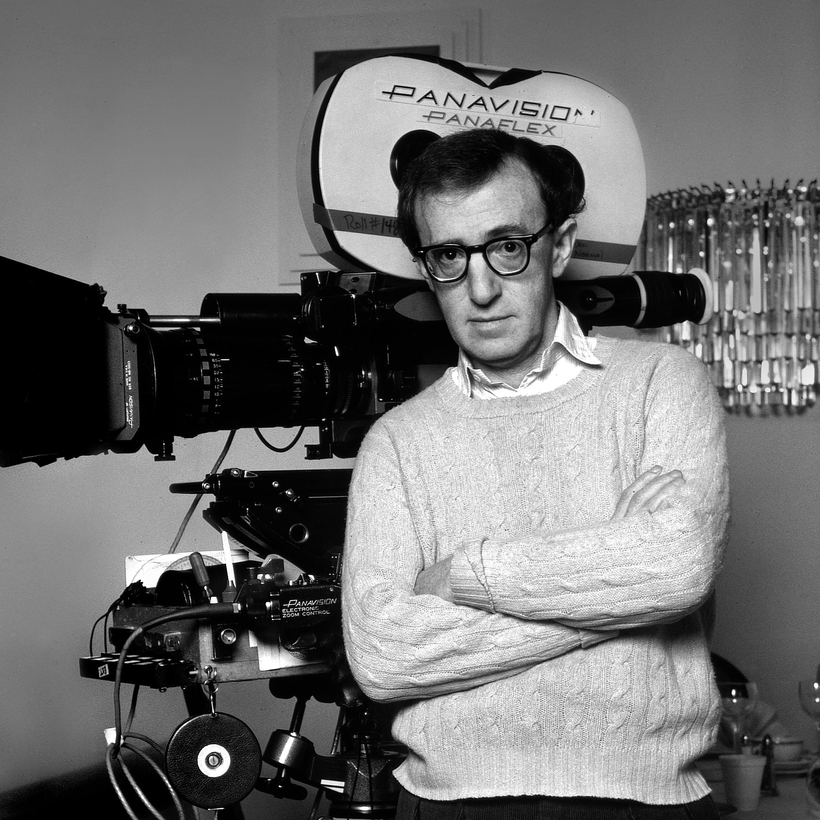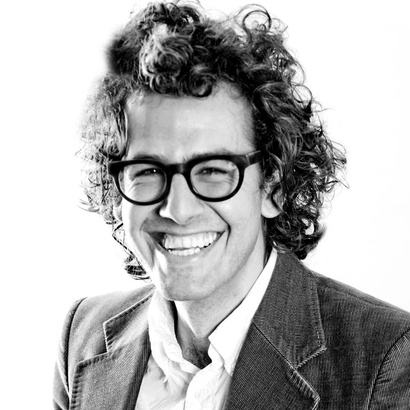I didn’t want to startle him. Leaning snugly against the armrest at the far corner of the couch, he was so small and still I was compelled to tiptoe in. When I did speak, it was in a whisper.
“Woody?”
“Where would you like to sit?” he asked, standing.
“Don’t get up—” No, I had spoken too firmly. “But … you can get up …”
I had disturbed him, then told him not to move. Now I was backtracking, stammering …
“Are you from New York?” he asked.
“Los Angeles,” I confessed.
“Did you go to school there?”
What school did he mean? I listed all of them. Soon, I was describing the fourth grade.
I must have been up to sixth grade when I realized the real education—for so many of us—was him.
Yes, I am a long-standing member of Woody Allen’s unofficial fan club, the only club I’ll belong to in spite of the fact that they would have someone like me for a member. Have you gotten our last newsletter? Sadly—between the allegations that he molested his daughter Dylan and the recent run of workman-like movies—our ranks have thinned in recent decades.
But I am still here, and always will be. Fifty-eight years after his debut feature, What’s Up, Tiger Lily?, I am in the very brownstone Allen shares with Soon-Yi, Mia Farrow’s estranged adopted daughter and Allen’s wife of 27 years. We are here, in his den, warmly decorated in the Thanksgiving reds and browns of Hannah and Her Sisters, because of Coup de Chance, his 50th—and, it has been rumored, final—movie.

An erotic thriller, filmed in France—in French—with French actors, the movie has drawn comparisons to Match Point, dramatizing as it does the condition of living in a senseless, amoral universe. Its title means “Stroke of Luck,” which is also a pretty good summary of how the movie finally ended up in theaters.
Despite some very favorable reviews and a five-minute standing ovation at the Venice Film Festival, no U.S. distributor picked it up. According to The Hollywood Reporter, a “‘samizdat’ link” to view the film began circulating among fans, and there was an unlicensed “NYC Premiér” at which Timothée Chalamet was said to have made an appearance. (“I don’t know how they would have gotten it,” Allen says, when I inform him about these underground screenings, “but I’m glad that people want to see the film.”)
Then, in mid-February, it was announced that M.P.I. Media Group, U.S. distributors of Allen’s last two pictures, A Rainy Day in New York and Rivkin’s Festival, would release Coup de Chance in April.
Allen, for his part, took the good news like he takes the bad: with a shrug.
“It doesn’t matter to me whether I get distributed here or not,” he says. “Once I make it, I don’t follow it anymore. Distribution is no longer what it was. Now distribution is two weeks in a cinema— ”
“You’re lucky to get two weeks—”
A “‘samizdat’ link” to view the film began circulating among fans, and there was an unlicensed “NYC Premiér” at which Timothée Chalamet was said to have made an appearance.
“And then that’s it. I mean, Annie Hall played in movie houses in New York for a little bit over a year. It’d be in one theater for six, seven months, and then somebody would pick it up and it would hang around another few months. The whole business has changed, and not in an appealing way. All the romance of filmmaking is gone.”
He is measured throughout, delivering this depressing pronouncement with only a hint of melancholy and zero agita. Is this really Woody? I never used to believe it when he said that that character on-screen wasn’t him. I do now. But that’s not the most surprising fact of his company. Far more puzzling, considering his vertiginous fall from cultural grace, is how he could be so sanguine.
“Someone asked me about cancel culture, and I said, ‘If you’re going to be canceled, this is the culture that you want to be canceled from.’ Because who wants to be part of this culture?” he asks, rhetorically, surrounded by emblems (remnants?) of a previous culture: the works of great authors on the bookshelves; DVDs (The Godfather, Reds, Annie Hall—three with Diane Keaton) on the coffee table.
“What do you get from making movies that you don’t get from writing?,” I ask.
“You want to see it on the screen,” he says. “You want to make movies because you love movies. And then, after a period of time, you start to think … ” He shrugs. “There are many directors who love the whole business of making movies, choosing the costumes and working with actors,” he says, citing Mike Nichols and Elia Kazan. “I never loved any of that.”
“But you’ve talked about how, making Match Point, you felt good, the stars aligned. How did this one feel?”
“I had a good time making it,” he says. “What could be bad? I’m living in Paris for a couple of months.” He tells me that he made it in French “as a strict gift for myself, an indulgence. I always wanted to be a European filmmaker.” (The actors delivered their lines in French but communicated with Allen in English.)
I ask if he did re-shoots on Coup de Chance, thinking of Annie Hall and Crimes and Misdemeanors, just two of the masterpieces that he wholly reimagined in the cutting room.
“I used to be able to do re-shoots the next day. It was me and Diane Keaton, me and Mia Farrow. It was easy to make a phone call. Now you can’t just say, ‘I want to shoot a whole other ending.’ I would have to fly over to France, make sure the actors were available.”
He does not appear to be troubled by these new creative constraints. In fact, it does not appear he’s troubled by anything, even the idea that none of us—if we are to believe Coup de Chance and Match Point and 2015’s Irrational Man—can do much to change our course in life.

“If we’re all at the mercy of chance,” I ask, “does that mean you can’t take artistic credit for your successes?”
“We like to think we make our luck, that we’re in control, we’re not so at the mercy of chance,” he says. “To a degree, you do make a big contribution to it. You work hard, but you’re not quite as in control as you like to think. With the films, sure, I wrote the script and used whatever skill I have in directing the actors to do what they do—I make a definite contribution. But there’s plenty of luck involved, too.”
“But you’re the auteur. Do you acknowledge that? That these are in fact Woody Allen movies?”
“Yes. It was a handmade product. I always felt that, for better or worse, I never had any excuses. I have no one to blame if a film didn’t come out great.”
“But by the same token, if it is a success, why don’t you take the credit? Doesn’t it have to be both to be true?”
“They’re not quite symmetrical. If the film is a success, it’s because a number of people have made contributions to it. If it’s a failure, you can mostly pin it on me,” he says, flipping the old J.F.K. line about victory having a thousand fathers and defeat being an orphan.
He is measured throughout, delivering this depressing pronouncement with only a hint of melancholy and zero agita. Is this really Woody?
“I’ve been misanthropic and lazy,” he adds.
“Sometimes you may be lazy, but misanthropic? You’ve shown me, reaffirmed for us, so much of what’s good in life.”
“It may not come out in the stories, but relationships don’t always end happy, and life is meaningless.”
“Meaningless, but good.”
“Only instinctively good. Not cerebrally good. You can’t give any reasons why you shouldn’t kill yourself. But you don’t do it, because there’s something that just resists instinctively.”
“But what does Isaac say into his tape recorder in Manhattan?,” I say, recalling his alter ego’s list of things that make life worth living (Groucho Marx, Louis Armstrong’s recording of “Potato Head Blues,” Swedish movies, etc.).
“Well, there are oases of pleasure in life,” he says, “but they are oases in a sea of sadness. At the end, it ends, and then what do you got?”
“Yeah, but 8 1/2 ends, and it’s still a great movie.”
“That’s one of the arguments you can make for cinema. You can see a Bergman film and confront these existential issues, but it comes to nothing. Whereas you see a Fred Astaire movie and for an hour and 20 minutes you block out the ugly reality of what’s going on outside of the cinema.”
“Why is Astaire any less real than Bergman?,” I ask, recalling that Annie Hall was originally titled “Anhedonia,” meaning the inability to feel pleasure. “Do you still watch Mort Sahl?”
“I do. I go on my phone. I get the thing, whatever you call it, the … ”
“YouTube?”
“YouTube on the phone. I still think he was the best thing I ever saw in terms of stand-up, bar none.” Then, a twinkle: “Sometimes I feel I’d like to do stand-up material again.”
“You should! I mean, you killed when you did Keaton’s A.F.I. Lifetime Achievement Award.”
“But you’ve got to stand up there for an hour. I mean, it’s different to stand up for five minutes.”
“Do you watch TV?”
“Turner Classics, first thing I turn it to. Just to make sure that Streetcar’s not on so I’m not missing anything. And sports.”
“Why do you care about who wins? It’s a game.”
“It’s pointless, and yet whether the Dodgers win or the Yankees win has as much meaning as anything out there.”
But it doesn’t seem to bother him. It’s hard to believe this man, patron saint of anxiety, has achieved, in the face of Hollywood exile, acceptance, or even equanimity.
“Would you want to live forever?,” I ask.
“Sometimes you don’t want to live beyond the weekend. But sometimes … I’d like the situation to be different, the whole mortality question, the whole structure of the universe and of life. I’d like it all to be different, just a more satisfying arrangement.”

I ask him about the rumors that Coup de Chance might be his final film.
“I’m on the fence about it. I don’t want to have to go out to raise money. I find that a pain in the neck,” he says. “But if someone shows up and calls in and says we want to back the film, then I would seriously consider it,” adding, “I would probably not have the willpower to say no, because I have so many ideas.”
Days later, reflecting on Woody’s inexplicable tranquility, I consider him anew, as one who, after a lifetime of therapy and decades of controversy, has looked inward and remained intact. I recall a comment he once made to a friend. “I’m holding a royal flush,” he said, “which is my innocence.”
Sam Wasson is a Writer at Large at Air Mail and the author of several books about Hollywood, including The Big Goodbye: Chinatown and the Last Years of Hollywood, as well as a co-author of Hollywood: The Oral History


